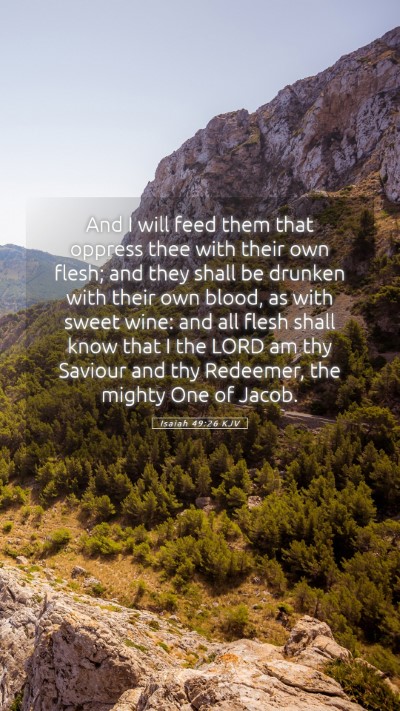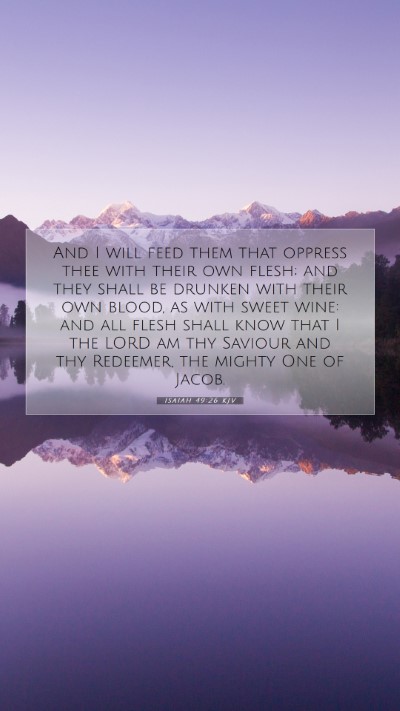Understanding Isaiah 49:26: A Comprehensive Commentary
Isaiah 49:26 states: "And I will feed them that oppress thee with their own flesh; and they shall be drunken with their own blood, as with sweet wine: and all flesh shall know that I the Lord am thy Saviour and thy Redeemer, the mighty One of Jacob." This verse carries profound implications, revealing God's justice and mercy towards His people and vindication over their oppressors. Below we delve into a combined interpretation based on esteemed public domain commentaries.
Verse Breakdown and Analysis
This verse highlights two main themes: divine retribution and spiritual revelation. Let’s explore these themes in depth.
- Divine Retribution:
Matthew Henry emphasizes that God will turn the oppressors' own actions against them. The imagery of feeding them their own flesh suggests that those who harm God's people will ultimately suffer from their own wickedness. The adversaries will face a fate they have inflicted upon others, illustrating the principle of divine justice (Galatians 6:7).
- Spiritual Revelation:
Albert Barnes posits that the latter part of the verse signifies a revelation of God’s identity. The phrase "all flesh shall know" indicates a universal acknowledgment of God as the Savior and Redeemer. This acknowledges that God will make His nature known through His actions towards both His people and their enemies.
Thematic Insights
The verse encompasses several significant themes that enhance our Bible verse understanding and interpretations:
- Justice and Judgment:
Adam Clarke points out that the metaphor of oppressors drinking their own blood underscores a complete reversal of fortune. This indicates that God's justice might be delayed but is inevitable; a crucial lesson for those studying scripture and understanding God’s workings in history.
- Redemption and Salvation:
By asserting Himself as the "mighty One of Jacob," God is reminding His followers of His mighty power to save and redeem, a central theme in biblical narratives. This aligns with Hebrews 7:25, where it is affirmed that Jesus is able to save completely those who come to God through Him.
- Universal Acknowledgment:
The promise that "all flesh shall know" reinforces the universal scope of God's sovereignty, transcending the barriers of nation and ethnicity. This prophetic assertion points to a future time when God's redemptive work through Christ will be recognized by all (Philippians 2:10-11).
Practical Applications
In light of this verse, individuals engaging in Bible study groups or online Bible study can ponder the following applications:
- Reflect on personal or communal acts of injustice and seek God's guidance on how to respond faithfully.
- Recognize that God will ultimately bring justice, which can encourage patience and faith in dire circumstances.
- As believers, explore ways to share the hope of God as a redeemer, especially with those who might feel oppressed or hopeless.
Cross References for Deeper Study
For further reflection, consider exploring these related scriptures:
- Galatians 6:7: Highlights the principle that one will reap what they sow.
- Hebrews 7:25: Discusses the completeness of Christ’s salvation.
- Philippians 2:10-11: Affirms the future acknowledgment of Jesus' lordship by all creation.
Conclusion
Isaiah 49:26 serves as a powerful reminder of God’s sovereignty, justice, and redemptive purpose. By examining this Bible verse commentary, believers can harness insights into living a faithfully responsive life to God's calling. Delve deeper into Bible verse meanings through community education and engaging study tools.


